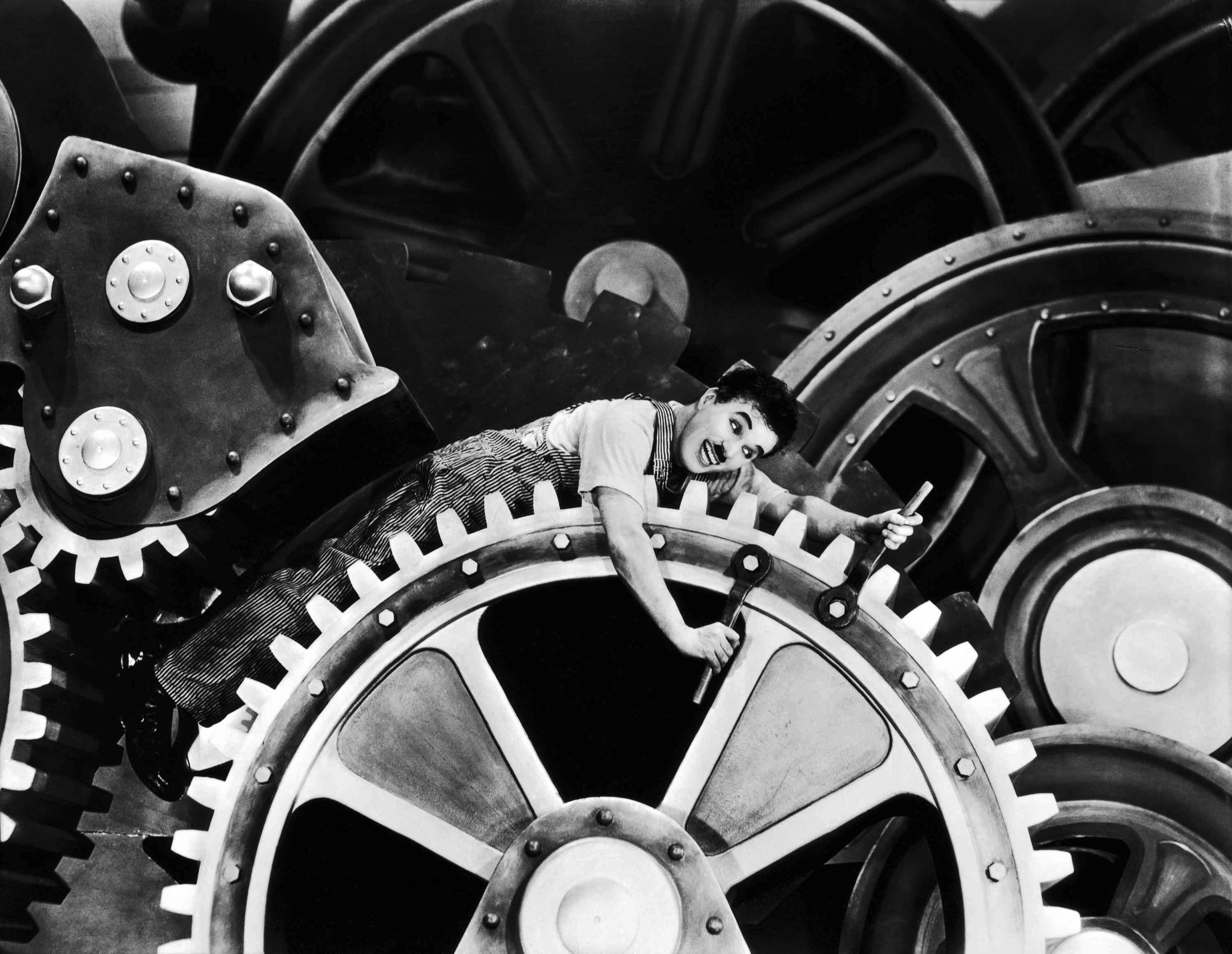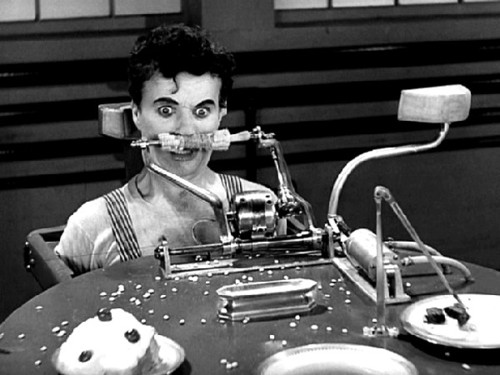Modern Times
Modern Times SlWS, 1936, 5 stars
Chaplin’s final masterpiece

The Little Tramp gets caught up in the gears of a modern society, literally. (Images copyright Charles Chaplin / United Artists)
Exclusive to MeierMovies, July 14, 2017
Modern Times, from 1936, is Charlie Chaplin’s final masterpiece. Yes, his Great Dictator, four years later, is a work of a greatness as well, but Modern Times represents so much in the history of cinema that it boggles the mind. As Chaplin had difficulty bringing the audible word to his work, I too have trouble putting into text exactly what this classic means to filmmaking.
First, it’s the last appearance of Chaplin’s Little Tramp, arguably the most influential and noteworthy character in live-action movie history. (Sorry, James Bond and Michael Corleone.) That the Tramp, in his final outing, should confront the political, social and economic realities of a sort of dystopian, Metropolis-like, hyper-modern landscape seems appropriate. And that the Tramp, like millions of others during the Great Depression, saw his dignity discarded in this tale of “industry, of individual enterprise, [of] humanity crusading in the pursuit of happiness” seems tragically inevitable.
Second, it is the final curtain for the silent-film era. Silents had all but died in the United States by 1929, but European films and Chaplin’s City Lights (1931) kept them going for a few more years. By 1936, the era was essentially over, but no one could quite bring themselves to say an official goodbye until they were given permission from Chaplin, the king of the silents. And Modern Times allowed audiences to do just that: watch the Little Tramp walk into the sunset (or, more specifically and appropriately, the sunrise) one last time – but this time, fittingly, arm in arm with his best girl (Paulette Goddard, as “the gamin, a child of the waterfront, who refuses to go hungry”).
Modern Times is not really a silent film, however, but a hybrid: a link between the silent and sound eras. (Even the frame rate was a hybrid, with some scenes appearing to be shot in the sound format of 24 frames per second but others shot with fewer frames, resulting in an old-fashioned, sped-up look when projected at 24fps.) City Lights, five years before, had included a synchronized score (by Chaplin) and some limited sound effects, but Modern Times took sound to the next level. We hear a vast array of sound effects and masterful music (including Chaplin’s “Smile”), and we even hear one character speak. (Of course, that speaker is the Tramp’s boss, a sort of Big Brother figure who appears on a kind of closed-circuit television throughout his factory, even in the bathrooms.) And most astonishing for audiences of the time, we finally hear Chaplin’s voice – though, in a stroke of genius, he’s singing gibberish.
My final praise for the film is purely subjective: It’s the greatest comedy – and funniest movie – of all time. (I challenge anyone to find a more uproarious moment than “The Feeding Machine.”) But, as with most of Chaplin’s other films, it’ll also make you cry your eyes out.
If all this sounds too good to be true, come see for yourself. The Enzian Theater, in Maitland, Florida, is showing the movie, for free, as part of its KidFest series, on July 16 at 1 p.m. and July 25 at 3 p.m. Admittedly, that’s a bit odd considering it’s not a children’s film; so much of the film will be lost on a young audience, including the cocaine joke and the anti-capitalist message. It would have been better suited for a Saturday Matinee Classic. Still, introducing kids to Chaplin is a noble endeavor, and, of course, the audience will probably be primarily adults.
Eighteen years after the release of Modern Times, songwriters John Turner and Geoffrey Parsons added words to Chaplin’s “Smile.” It wasn’t difficult. Just watch Modern Times and the lyrics will probably come to you too:
“Smile, though your heart is aching,
Smile, even though it’s breaking.
When there are clouds in the sky
you’ll get by.
If you smile through your fear and sorrow
Smile and maybe tomorrow
You’ll see the sun come shining through
for you.
Light up your face with gladness,
Hide every trace of sadness.
Although a tear may be ever so near,
That’s the time you must keep on trying.
Smile: what’s the use of crying?
You’ll find that life is still worthwhile
If you’ll just
Smile.”
And I might add: laugh. Laugh like you’ve never laughed before!
© 2017 MeierMovies, LLC
For more about information about the movie, visit IMDB and Wikipedia.
